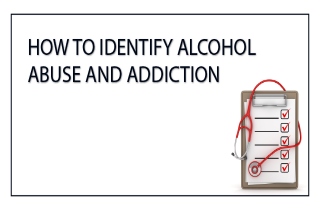Identifying alcohol abuse and addiction
Early diagnosis and treatment of alcohol abuse and addiction is imperative to successful recovery. Individuals who seek treatment while in the early stages of the addiction are generally more likely to be successful than those who are in the late stages of addiction. The later a person seeks treatment, the harder it is to change their behaviors and achieve the goal of long-term sobriety.
So, how can you identify an addiction problem? We review here. Then, we invite your questions about the process at the end.
How to tell if someone has alcohol abuse and addiction
There are a number of warning signs to watch for to identify alcohol abuse and addiction. While you can watch for some of these signs yourself, an actual diagnosis of an alcohol addiction can only be made by a trained addiction specialist or other medical professional. Some questions doctors ask during the diagnosis process can be used to tell is someone is abusing or addicted to alcohol. These include:
- Do you attempt to hide your drinking from others?
- Do you experience alcohol withdrawal symptoms when you don’t drink for several hours or days?
- Do you find that you’ve developed a tolerance to alcohol, or need to drink more and more to become tipsy or drunk?
- Do you often end up having more drinks or drinking for a longer period of time than you originally intended?
- Do you continue to drink, despite problems it has caused in your life, including legal or health problems, or problems at home, school, or work?
- Do you spend a great deal of time either drinking or recovering from a drinking episode?
- Do you find that you’re now spending more time drinking or recovering from a drinking episode than you spend on activities that you once enjoyed?
- Have you tried to quit drinking but failed more than once?
In order to diagnose a person with alcoholism, however, you’ll need to consult an expert. Seek a diagnosis from a medical doctor, psychiatrist, or licensed psychologist. These experts will usually conduct a complete physical examination and explore their family history of substance abuse.
Identify alcohol abuse and addiction…now what?
Once an alcohol abuse and addiction problem has been diagnosed, getting into treatment quickly is recommended. The following list can give you an idea of some of the steps you’ll have to take in order to get someone into treatment, whether it’s yourself or a loved one.
1. Accept the alcohol problem. Inform your loved ones of your decision to seek alcohol addiction treatment. During recovery, you’ll need their support and help.
2. Speak with an addiction specialist, who will help you decide on the best course of treatment for you. Assessment will help establish a baseline addiction treatment plan.
3. Arrange to begin alcohol addiction treatment, either on an inpatient or outpatient basis.
Help for alcohol abuse and addiction questions
If you or a loved one is ready to get help for alcohol abuse and addiction, questions and concerns are normal. Feel free to leave any of your questions or concerns about alcohol addiction in the comments section below. We’ll do our best to offer you a timely reply and help point you in the right direction.









Related Posts